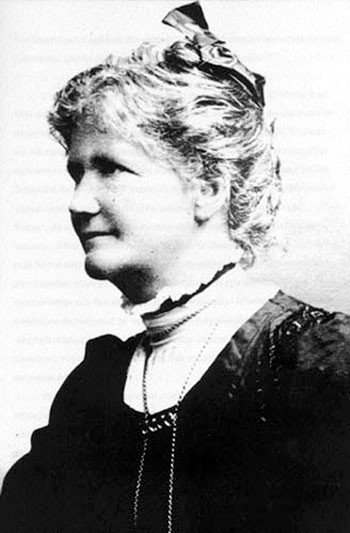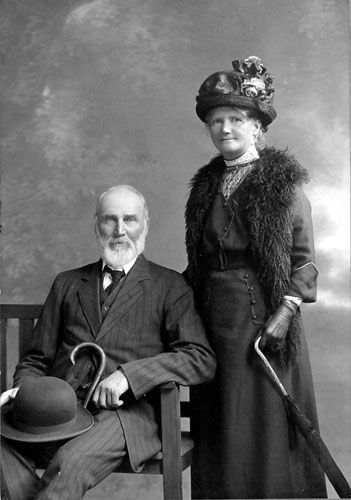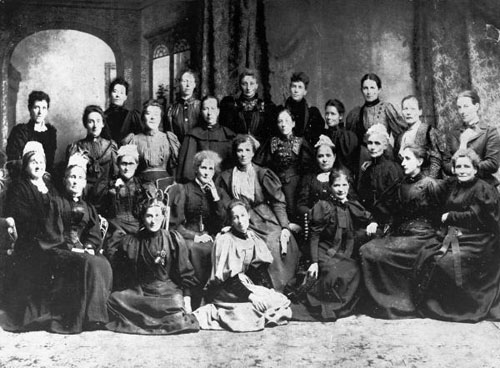
|
|
Abstract: Compilation of documents about an early feminist and peace advocate who received a Tablet from Abdu'l-Bahá in 1908. Notes: Bain's middle name is alternately given as Sherrif, Sherriff, and Sherif. See Bain's 1913 newspaper article "Bahaism Today." |
1. Passing mention of Bain in Stockman's Chicago House of Spirituality notes
Minutes of the House of Spirituality 29 Sept. 1908
They have received a tablet for Wilhelmina S. Bain of New Zealand! |
2. Summary of the Tablet in the Barstow collection
302. A - B
Date trans., Apr. 2, 1908, by M. Ahmad. Esphahani, 2 pp.
Tablet to Wilhelmina Bain, New Zealand
Subjects: Confirmation & assistance
Language of Esperanto - Universal language will undergo some changes &
alterations & will become adopted -- A more complete language than this.
About seeking guidance: (prayer) whatsoever question thou hast in thy heart,
(1) turn thy heart toward the kingdom,
(2) entreat the Almighty
(3) reflect upon that problem,
(4) then unquestioningly the Light of Truth shall dawn.
Quote: "the ensign of the Most Great Peace is the Teachings of Bahá'u'lláh." |
3. "Wilhelmina Sheriff Bain (1848-1944) An early advocate of the Baha’i Faith in New Zealand, 1908," from archive.org
The National Library of New Zealand has an ongoing newspaper digitisation project with text search capabilities. One of the newspapers being digitised is the Otago Witness, a weekly newspaper existing between 1851-1932. In the December 30th 1908 edition of that newspaper is a lengthy article on the Baha’i Faith (sometimes referred to as Behaism/Bahaism). The author is well known New Zealand feminist and social activist Wilhelmina Sheriff Bain (1848-1944). The article, accurate and well written given the paucity of information available at that time is interesting in two key respects.First the author indicates that she has received private information that Abdu’l-Baha, the then leader of the Baha’i community, up until the Young Turk rebellion, subject to Ottoman royal decree of exile “has been liberated from life-long captivity in Akka, the Acre of the Crusaders”. This indicates that she has an external correspondent, possibly in Palestine or more likely the United kingdom. Secondly she says at the end of the article “Note. The writer of the above article will be pleased to furnish the details of Behaism to sincere seekers.” This indicates that Wilhelmina Bain was interested, to some degree in sharing the Baha’i message with those who were interested and sincere. At the very least this indicates that she found the Baha’i message agreeable. Certainly her article can be construed as sympathetic to the Baha’i message.
In 1904 Wilhelmina Bain attended the International Congress of Women in Berlin. On her return to New Zealand she also attended the eleventh Universal Peace Congress in Boston, Massachusetts USA. One of the attendees at the conference was Sarah Jane Farmer a well known American feminist and peace activist (Portsmouth Peace Treaty 1905) and social progressive at Green Acre, Eliot Maine who had by that date adopted a Baha’i identity following a visit to Abdul-Baha in Ottoman Haifa in 1900. Sarah Jane Farmer may have been Wilhelmina Bain’s informant and correspondent concerning the Baha’i Faith.
Bain was at this time probably living in Riverton in the South Island and was embarking on a career in journalism. This newspaper article adds to the number of instances of interest in and communication with the Palestine based headquarters of the Baha’i Faith by New Zealanders prior to 1920. Letters exist of contact in 1910 with high country farming woman Mildred Burdon of Geraldine and the Baha’i leader Abdu’l-Baha and again in 1919 with Havelock North farmer Maurice Chambers. The recognised first believer of the New Zealand Baha’i Community is Margaret Stevenson (1865-1941) of Devonport, Auckland. She states in a manuscript that she adopted the Baha’i Faith in 1913.
4. "Wilhelmina Bain," by Simon Daisley, from New Zealand History Online
Wilhelmina Sherriff Bain was a feminist and peace activist who gained notoriety for her outspoken views against New Zealand’s participation in the South African War. Born in Edinburgh, Scotland in 1848, her family immigrated to New Zealand in 1858 where they chose to settle in Invercargill.In 1879 Bain became a teacher and worked in the Invercargill region. She remained in this profession until 1893 after which she eventually moved north to Christchurch to work as a librarian. It was there, in 1896, that she became the president of the Canterbury Women’s Institute. In this role she hosted the first meeting of the National Council of Women of New Zealand (NCW). Despite moving to teach in the Auckland and Taranaki regions, Bain remained involved in the NCW and in 1901 she was chosen to represent New Zealand on the committee of the International Council of Women. As New Zealand’s representative she attended the 1904 meeting of the ICW held in Berlin.
In 1914, at the age of 66, Bain married business owner Robert Archibald Elliot. Sadly their marriage lasted only six years as Robert died on 7 July 1920.
Throughout her life Bain supported many causes such as prison reform, equality for women and worker’s rights. As a peace activist she was forthright in criticising New Zealand’s involvement in the South African War. Speaking at the 1900 conference of the NCW in Dunedin she earned the ire of the local newspapers after voicing her opinions on the war effort. In order to avoid public criticism of its organisation, the NCW was forced to distance itself from Bain’s viewpoints. Despite this negative publicity, Bain remained committed to opposing war and militarism. She believed that while warfare had played a necessary role in the past, human civilisation had reached a point where it was no longer required.
Bain was also an accomplished writer and from 1910-1913 she had worked as a journalist in Riverton. Later in her life she travelled to London where she had two of her literary works published; a collection of her poems entitled From Zealandia and her novel Service: a New Zealand story. Despite all her efforts as an activist, it was her achievements as an author for which she was remembered at the time of her death on 26 January 1944.
5. Photo and more info, from another page at New Zealand History Online
 |
Wilhelmina Sherriff Bain (pictured here on her wedding day in 1914) was one of a few feminists vehemently opposed to the South African War. She gained notoriety after a speech she gave at the annual conference of the National Council of Women in 1900 where she claimed that New Zealand:
...had thrown itself headlong into the melee of old-world turmoil. We had selected from our young men those of the very finest physique and we had sent them across the Tasman Sea and the Indian Ocean to slay boys of 16 and old men of 70, or be slain in the attempt. Our poor British boys were led through the black night that they might bayonet to death Boers slumbering within their tents, and the horror was justified. When the Boers committed any special atrocity, our language failed to express enough reprobation. (Otago Daily Times, 11 May 1900, p. 2) |
6. "Bain, Wilhelmina Sherriff," by Megan Hutching, from Encyclopedia of New Zealand
Wilhelmina Sherriff (registered as William Sherif) Bain was born in Edinburgh, Scotland, on 5 September 1848, the daughter of Elizabeth Middlemass and her husband, John Bain, a spirit merchant. She came to New Zealand on the Gloucester in 1858 with her parents, four sisters and one brother and settled in Invercargill. Another brother, James Walker Bain, preceded the family to New Zealand, and became MHR for Invercargill from 1879 to 1881 and mayor in 1892.Wilhelmina Sherriff Bain (she always used her full name) became a teacher in 1879. She taught in and around Invercargill until at least 1893 but by 1896 was living in Christchurch where she worked as a librarian. As president of the Canterbury Women's Institute that year, Bain hosted the inaugural meeting of the National Council of Women of New Zealand (NCW). She was probably the NCW member most identified with the cause of peace and arbitration during the council's first years from 1896 to 1906. She consistently articulated her opposition to war at NCW meetings and in public forums and once stated that she 'would live, and die, for Peace'. Her support for arbitration as a means of resolving conflict was rooted in her strong Christian faith and her belief in the bonds of humanity.
Bain lived in Christchurch until around 1899 then moved to Auckland, but by 1902 she was living in Taranaki, where she taught at Inglewood until 1904. At the 1900 conference of the NCW in Dunedin she delivered a speech on peace and arbitration which, while New Zealand soldiers were at war in South Africa, brought down the wrath of local newspaper editors and residents on the heads of the NCW. At the 1901 conference in Wanganui she was elected New Zealand's representative on the International Council of Women's standing committee on peace and arbitration, and in 1904 she travelled to Berlin to attend the quinquennial meeting of the ICW. She gave an address there and subsequently published a booklet on the proceedings. On her journey back to New Zealand later that year she also gave an address to the 13th Universal Peace Congress in Boston.
By 1909 Bain was working as a clerk in Riverton and looking after her invalid sister. From 1910 to 1913 she was employed there as a journalist. She worked hard in opposition to compulsory military training, introduced in New Zealand as a result of the 1909 Defence Act, and published a long article on this theme in the Southland Times in 1911. She also helped organise the Aparima Peace Union in 1912. However, peace was not her only interest: at NCW meetings she had also spoken in support of prison reform, women jurors, and protective laws for workers. As a teacher, she had agitated for more women on school boards and committees and the establishment of the principle of equal pay for equal work. A vegetarian and a spiritualist, she was also apparently an accomplished pianist and linguist; it is said that she spoke eight languages.
In 1914 at Invercargill, on her 66th birthday, Bain married Robert Archibald Elliot, a widower and general merchant from Fortrose. Elliot was quite a wealthy man who owned three general stores in Fortrose, Waimahaka and Tokanui. He died on 7 July 1920. Wilhelmina was not one to sit still, however, and in her 70s travelled to London where she had two books published: her collected poems, From Zealandia, and a novel, Service: a New Zealand Story. On her return she lived in Auckland until she died there aged 95 on 26 January 1944.
A tiny woman, 'perfect in her speech', her public profile was low in later years and when she died she was remembered for her 'distinct literary gifts' rather than for her activism against war.
 |
Wilhelmina Sherriff Bain on the occasion of her marriage to Robert Elliot, 1914. Source: Canterbury Museum, NZ |
 |
National Council of Women, Christchurch, 1896. Included in this NCW photograph are, standing: Jessie Mackay (fifth from left), Jessie Williamson (second from right); seated: Amey Daldy (second from left), Anna Stout (fourth from left), Kate Sheppard (fifth from left), Annie Schnackenberg (sixth from left), Margaret Sievwright (seventh from left), Marianne Tasker (eighth from left); and, seated on floor: Ada Wells (centre) and Wilhelmina Bain (right). Source: Alexander Turnbull Library, NZ |
|
|